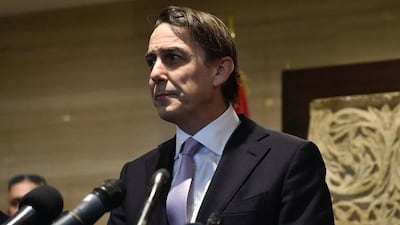Live updates: Follow the latest on Israel-Gaza
Amos Hochstein, the US envoy who played a key role in mediating the ceasefire in Lebanon, has outlined the country's immediate reconstruction needs and called for support from nations including Gulf countries.
Entire villages have been razed and neighbourhoods across Lebanon, including in Beirut, have suffered extensive damage after weeks of ferocious bombardment by Israel as it attacked Hezbollah.
Speaking online to members of the Lebanese-American community, Mr Hochstein on Wednesday emphasised the need for international collaboration in rebuilding efforts.
“Repairing people's homes and farms is critical,” he said. “But we also need to fix infrastructure – the electricity grid, roads and bridges.”
The envoy stressed the importance of fostering an environment that encourages entrepreneurship and investment from the Lebanese diaspora. “Lebanese entrepreneurs are among the best in the world,” Mr Hochstein said.
“If they can just do 10 per cent of their entrepreneurship in Lebanon, but there's a reason they don't do it. Let's do things that will encourage them to do it.”
Mr Hochstein called for broad international participation in reconstruction efforts, noting that support should extend beyond southern Lebanon and benefit the entire country.
“Now is the moment of opportunity for Lebanon to say to the Gulf countries: 'Welcome back'. This is a safe place for you to invest',” he said. “And we, the United States, and myself, fortunately, are going to do everything we can to encourage them to come by.”
Mr Hochstein said a US delegation will arrive in Beirut as early as Thursday to begin consultations. “They will be in communication with the Israelis as well. Because the mechanism is not meant just for Lebanon. It's meant for neither side to violate this.”
He confirmed he spoke with French President Emmanuel Macron to ensure co-ordinated efforts, stating that France is sending their delegation to Lebanon as well.
The war escalated after nearly a year of cross-border fire initiated by Hezbollah in support of its Palestinian ally Hamas, whose attack on Israel on October 7 last year sparked the devastating war in Gaza.
Israel shifted its focus from Gaza to Lebanon in September to secure its northern border from Hezbollah attacks, and dealt the movement a series of blows including the killing of longtime leader Hassan Nasrallah.
Thousands of Lebanese civilians displaced by the conflict returned to their homes on Wednesday as the ceasefire took effect. Driving vehicles loaded with personal belongings, many defied warnings from Lebanese and Israeli forces to avoid certain areas.
When asked whether he believes the Lebanese government and armed forces will successfully address Hezbollah's disarmament, Mr Hochstein said the negotiated agreement mandates Hezbollah's withdrawal from the area.
“That is their job to do today. The government of Lebanon passed a resolution formally authorising the Lebanese army and instructing them to go and do just that. That is a change that was never the case before,” he said.
Mr Hochstein noted that the international community now expects the Lebanese Parliament to elect a president after a two-year vacancy.


